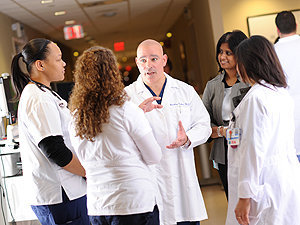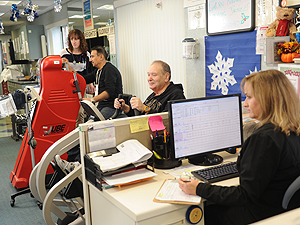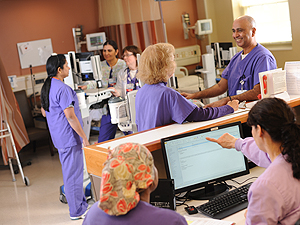Clinical Rotations
Inpatient Medicine
Medicine teams, consisting of two-resident day and night teams, are responsible for the care of the Family Medicine Center patients requiring hospitalization, emergency room assessments, admissions from private attendings, and for emergent care of any hospitalized patients. A Family Medicine faculty member functions as the teaching attending for these patients and oversees the care delivered by the residents via daily teaching rounds.
The Director of Medicine and a Family Medicine faculty member, along with a number of attending internists and subspecialists on the medical staff, directly oversee the inpatient internal medicine rotation. Attending physicians admit patients to the Medical Teaching Service and thereby actively participate in the teaching program on a daily basis. All admissions are formally presented to selected attending physicians at "sign-out" rounds. As a result, instruction is assured from four complementary sources: the Director of Medicine, the attending staff physicians, the Family Medicine faculty and senior residents.
Family Medicine residents from all three years comprise the medicine teams responsible for the initial evaluation, the diagnostic workup, and the therapeutic management of patients admitted to the teaching service. Residents learn the different aspects of patient care by following patients from the beginning of their hospitalization through to their discharge. Additionally, the patient's primary care resident actively participates in the management of their patients regardless of their rotation. This ensures continuity of patient care. There is also a significant longitudinal experience in the Intensive and Coronary Care units as well as a "block" rotation in cardiology. The transition from junior to senior resident responsibilities in medicine occurs during the second year. The resident begins to assume an active teaching role, an important skill to be developed to complement the basic clinical skills. In addition to responding to all medical emergencies in the hospital, the senior resident is the code team leader for all cardiopulmonary arrests.
Pediatrics

Pediatrics
The Department of Pediatrics operates under the guidance of two full-time directors who are...
Read More

Surgery
The department is staffed by more than 100 BE/BC surgeons. There is an advanced...
Read More

Obstetrics
Approximately 1,200 deliveries are performed each year at South Nassau Communities...
Read More

Emergency Medicine
Our modern Level II Emergency Department is one of the busiest on Long
Island's South Shore...
Read More

Family Medicine
Throughout their three years, all residents have their continuity clinics at the Family Medicine Center....
Read More

Subspecialties
Surgical subspecialties include orthopedics, ENT, urology and ophthalmology. They are primarily...
Read More

Geriatrics
There is a block rotation during the second year of residency based at a geriatric facility in the area....
Read More

Orthopedics & Sports Medicine
Two months of orthopedics & sports medicine are required of all...
Read More

Other Education
In the third year, there is a rotation emphasizing contemporary practice management...
Read More